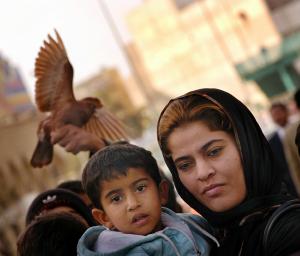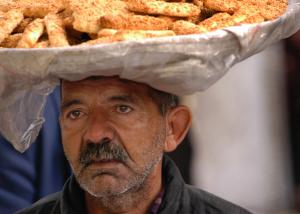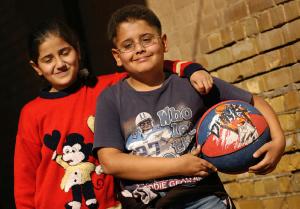Issue Date: April 11, 2003
Iraq Diary: As bombs drop, faces of Iraqis still haunt me By JOEL PRESTON SMITH Baghdad Journal, March 20 This morning I woke up to bleak images of Baghdad at sunrise, and the vague rumble and flash of explosions broadcast live on CNN. For more than six months, sometime after U.S. President George W. Bush began his personal crusade against Iraq, I have been praying this day would never come. I worked as an American photojournalist in Iraq, principally in Baghdad, from Jan. 8 through Feb. 27, in the mistaken and self-deluded belief that I could make a contribution to stopping the war. I believed that if I could show the faces of the people who would be killed, if I could show the humanity and dignity of the Iraqis, and the similarities between our two cultures, Americans might identify with the Iraqis and work against the war. I was honest and fair, I believe, but far less than objective. To be objective, I felt, was to look on the impending war passively, disinterestedly, with no stake in the outcome. I did have a stake in the outcome. I wanted peace for myself, my children, and for the people who share the world with my children. Part of my goal was to show the daily lives of Iraqi people. I wanted to counter the prevailing (malicious and intentionally deceptive) image of Iraq, and the Arab states, that we see in the West. In the principally white-dominated culture of the United States and Great Britain, Western media tend to depict Muslims and the peoples of the Middle East wholly
as extremists, religious fanatics and gun-slinging terrorists. An angry young man with an AK-47 and turban too often embodies Western perceptions of the Islamic world, one-fifth of the world’s population, spread over every nation on earth. A variation on this theme is the attempt to portray 1 billion Muslims as literal reflections of Saddam Hussein or Osama bin Laden. In the seven weeks I worked in Iraq, I saw an entirely different image of Muslims and of the Iraqi people (some of whom are Christian, some Jewish, some Hindu and atheist). The faces of the people I photographed now haunt me. As the sky lit up in Baghdad this morning, I thought of a mother in an alley I photographed wiping the tears from her son’s cheek. I thought of a mother carrying her son through a crowded Baghdad market; the weight of his body. I thought of the burden she carries daily -- her worries, her sorrow at the struggle to shoulder the weight of another day, and how, in my photograph, that weight is written on her sad but beautiful face. Old men selling their life’s collection of books for food, musicians rapt with the sound of their own instrument, college students competing to answer a teacher’s question, handsome hotel clerks posing in their white starched shirts, men grilling cod over charcoal fires on sidewalks in darkness, construction workers, artists, children dying of cancer, auctioneers, taxi drivers, tea merchants, even fashion models in a state-run fashion show -- I photographed them all. Every day, I was wrought with the beauty and honesty of the Iraqi people, with how similar they are, in their daily life, even in their beliefs and aspirations, to the Americans and the British. Despite the fact that I am clearly not an Arab -- my blue eyes and white skin would draw stares and drop jaws everywhere I went -- I was never treated with anything but kindness and respect. As I walked the streets of Baghdad, shop owners would run out to the sidewalk and invite me in for tea or Turkish coffee. Mothers, gushing at the chance to speak with an American, would ask me to photograph their children. Men would introduce themselves and ask if I would like to trade e-mail addresses with them, so they could practice their English, make a new friend.
Of all of them, the face that haunts me most is that of a 12-year-old boy who looks remarkably like my 13-year-old son in the United States. (I have two boys.) This boy is chunky, wears wire-rimmed glasses, has big teeth and a smile that is tender and trusting. He looks like a bookworm and a teddy bear at the same time. We played basketball together one day, with six other boys, and I kept fighting against just standing still and staring at him. I loved him the instant I saw him. The next day he was walking past the French Interest Office (a step down from an embassy) in Baghdad, a few blocks away from his apartment complex, carrying a basketball. I was supposed to be photographing a peace demonstration, but I put the camera away and passed the ball with him. I showed him how to make a pass behind his back. After about 15 minutes, just tossing the ball back and forth, he said goodbye and started jogging away. Ever since that day, I’ve never slept without seeing his face, a face so like my son’s. I wanted him and my son to share the same future, a time full of love, hope, safety, joy. I can’t help but feel that I’ve failed them both. Sadly, the only people’s lives I’ve touched with my work are those that seem to have the capacity to be moved by the beauty of a human face. Most of the people who’ve written to me over the past two months cried in front of me when I showed them the images I love best, never needed to be convinced. They, like me, wanted peace long before this war began. But the people I most needed to convince seem unmoved by either reason or emotion. As I see the destruction that’s beginning in Iraq, I am reliving the moments I spent photographing in Baghdad. The photographs are often beautiful, I believe, but they are not as beautiful as the lives of the people themselves. Today I have a string of prayer beads in my right pocket, and a hole in my heart where I keep the memory of an Iraqi child I love and am deeply worried about. I am afraid that he and others may now exist only in my photographs. I would trade all my work, my photos and my memories for the lost lives they represent. Joel Preston Smith filed this story from Amman, Jordan. Smith is a freelance writer and photographer based in Portland, Ore. National Catholic Reporter, April 11, 2003 |


